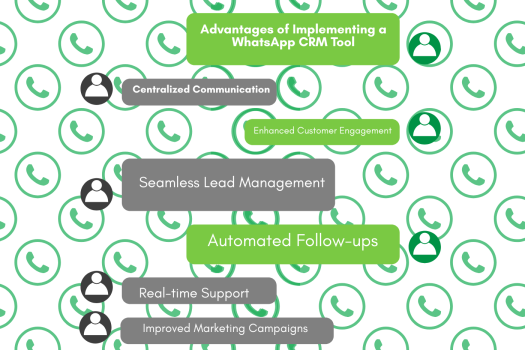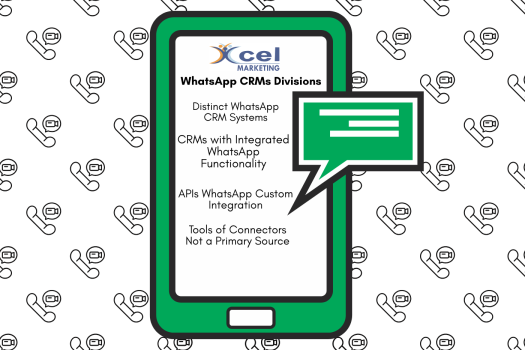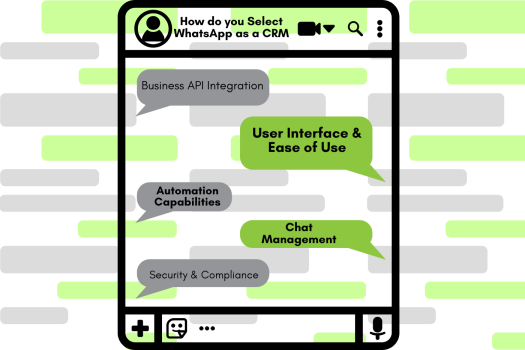+91-78382-22255
support@xcelmarketing.in
BLOG'S
Table of Contents
Published on: May 26, 2025 05:38 PM
How To Grow Your Business Fast With A WhatsApp CRM Integration?
Like every other industry, the
marketing and communications sector is evolving due to the increase in the
usage of technology. Businesses aim to engage customers quicker and in the most
efficient manner possible. In the realm of customer communication, few tools
are as effective as WhatsApp. By
incorporating a good CRM system, it
simplifies the process of nurturing leads, servicing customers, selling and
also marketing. This synergy is known as WhatsApp
CRM Integration and it is pivotal for brands looking to grow your business in a short time
frame.
Over the course of the article,
we will undertake an analysis of What
Does WhatsApp CRM Means along with the Advantages
of WhatsApp CRM tools, integration of it, as well as the resulting
empowerment of sales and marketing operations and customer support.
What is WhatsApp CRM?
An interface of WhatsApp Business API with a Customer Relationship Management (CRM) approaches system repository is
what CRM WhatsApp entails. Through this ERP interface, corporations can manage customer’s
conversations over messaging platforms, automate workflows of communication,
monitor customer engagements and
handle data filtration as well as processing through their CRM systems.
Owing to the unified workspace to
take care of customer interaction,
it is no longer needed to switch between WhatsApp
Web and a separate CRM platform.
Advantages of Implementing a WhatsApp CRM Tool

A powerful WhatsApp CRM Tool offers distinct advantages, including fostering
better communication, improving efficiency, engaging customers and facilitating
relationship management, thus making it essential in modern business
environments. Following are the advantages:
1. Centralized Communication
Conducting WhatsApp CRM integration ensures that all messages as well as
inquiries and responses are recorded and handled centrally. This takes care of
communication gaps and helps retain every single potential customer.
2. Enhanced Customer Engagement
Receiving timely, tailored
messages enhances customer engagement.
With WhatsApp integration, every inquiry is addressed, reinforcing customer’s
perceptions that they are appreciated.
3. Seamless Lead Management
With CRM WhatsApp, businesses have the capability to tag leads, assign
them to particular agents and monitor their progress at different stages within
the funnel. This structured approach to lead
management improves overall conversion rates.
4. Automated Follow-ups
Automated follow-ups via chatbots
or set templates are possible with CRM
WhatsApp integration. These automation tools preserve the flow of
conversation without requiring manual tasks.
5. Real-time Support
Using WhatsApp Business to respond to customer queries instantly enhances
customer loyalty and satisfaction. Businesses are able to provide auto
responders or FAQs and also have the option to transfer the discussions to live
agents as needed.
6. Improved Marketing Campaigns
Execute targeted marketing campaigns by tapping
Segmentation; leverage CRM data to send WhatsApp
messages with higher engagement
rates.
WhatsApp Integration with CRM
Step 1: Setting Up WhatsApp Business API
At the onset, you need to acquire
access to the WhatsApp Business API.
Usually, this is done via a Business
WhatsApp API Service Provider, which aids in setting up, verifying and customizing
the business account.
Step 2: Select the CRM with Available WhatsApp Integration
Not every CRM system can support WhatsApp Integration. Select frameworks
like Zoho CRM, HubSpot, Salesforce or ever Freshworks that offer native or
through other providers WhatsApp CRM
integration.
Step 3: Use Middleware or Integration Platforms
Integrating systems like Twilio,
Gupshup and WATI can be used to connect your CRM with WhatsApp API for business.
Step 4: Set Up the Integration
Define rules for message
dispatching, auto responder systems, chatbot activation and lead tagging.
Ensure automatic logging of conversations into the CRM.
Step 5: Test Integration and Team Training
Complete flow testing ensures all
scenarios function properly. Equip your sales, support and marketing teams with
training on using the integrated dashboard to optimize workflow.
Using WhatsApp as a CRM Tool for Sales, Marketing, Customer Support and
Operations
We have already discussed the
benefits of WhatsApp CRM integration in various business functions. Now let’s
analyze every segment in detail.
Sales
Sales personnel are able to
handle:
·
Automated lead qualification checks.
·
Hands-free follow up automation.
·
Reviewing customer interactions pre pitch.
·
WhatsApp delivery of product demo, pricing and catalogues.
This enhances accuracy and
expedites deal closure.
Operations
The operations teams are enabled
to:
·
Update customers on order status, shipment
details or even appointments using WhatsApp Business API.
·
Self-service automation for updates and
approvals.
·
Flexibly coordinate internal processes while
using messages integrated with CRM systems.
The described processes aid in
maintaining the schedule and keeping everyone updated.
WhatsApp CRMs Divisions

Based on the scale and complexity
of a business, there are different WhatsApp
CRM systems.
1. Distinct WhatsApp CRM Systems
These are specialized systems
that integrate CRM functionalities with WhatsApp.
Examples are WATI, ZOKO and AiSensy. Such systems come with built-in templates,
automation and dashboards.
2. CRMs with Integrated WhatsApp Functionality
Some CRMs, for instance, Hubspot
and Zoho, offer WhatsApp CRM integration,
permitting users to handle WhatsApp conversations from within the CRM
application.
3. APIs WhatsApp Custom Integration
Built for specialized business
operations, this is more flexible as it is built using WhatsApp Business API and CRM APIs for WhatsApp integrations.
4. Tools of Connectors Not a Primary Source
As bridges, these tools link any
CRM system to WhatsApp, which include Twilio, Gupshup and Zapier.
How do you Select WhatsApp as a CRM?

For WhatsApp CRM, these are the following outlined considerations.
Business API Integration
Make sure the CRM supports
integration with WhatsApp Business API
natively or through a middle layer.
User Interface & Ease of Use
The dashboards within the CRM
should be ergonomic and designed for your teams to promote efficiency.
Automation Capabilities
Focus on CRMs that offer
automation for responding, assigning leads and managing workflows via WhatsApp.
Chat Management
Multi-agent support, ticketing,
history of conversations and customer tagging are necessary functionalities.
Integration with Existing Tools
It should integrate well with
other tools like email, voice and eCommerce systems to enhance operational
efficiency.
Security & Compliance
The protection of data is
crucial. Select a CRM which guarantees the protection of customer interaction data and is compliant to GDPl regulations.
Analytics & Reporting
In-depth analysis of response
time, message delivery, open rates and customer satisfaction provides valuable
insights that enhance your marketing
campaigns and customer service initiatives.
Business WhatsApp API Service Provider Support
A reliable Business WhatsApp API service provider should offer uninterrupted
communication, therefore technical support and assistance is critical for a
good WhatsApp CRM Tool.
Why WhatsApp CRM Integration is Crucial to Grow Your Business?
There are several reasons to grow
your business with WhatsApp CRM Integration.
This is how it helps grow your business:
· Lead
Conquests: Follow ups and messaging in real time eliminates delays in the
sales cycle.
· Enhanced
Customer Retention: Regular customer
engagement strengthens loyalty resulting in return business.
· Lower
Cost for Marketing: Achieve maximum impact with minimal spending.
· Improved
Productivity: Consolidated frameworks increase streamlined workflows and
reduce redundant tasks.
· Always
Accessible: Customer queries can be handled through chatbots at any time,
which improves service satisfaction.
Conclusion
With the rise of instant
messaging, businesses can now communicate market, sell and provide support with
the help of WhatsApp CRM Integration.
The combination of WhatsApp and a CRM WhatsApp system allows companies to
automate customer interactions
meaningfully, automate repetitive tasks and scale operations efficiently.